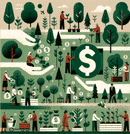Noticias
Successful south-south exchange between Latin American countries on forest degradation monitoring
22/12/2023
22/12/2023

Experts from Argentina, Chile, Colombia, Costa Rica, Honduras, Mexico, and Peru met in the Amazon city of Florencia (Colombia)
Forest degradation generates large carbon emissions (34% of forest sector emissions, FAO 2020). Preventing forest degradation reduces emissions while safeguarding forest ecosystem health and maximizes forest productivity to community livelihoods and the broader economy. Estimating carbon emissions and removals from forest degradation is thus a requirement to participate in new climate finance opportunities.
UN-REDD Programme with the technical support from the United Nations Food and Agriculture Organization (FAO) and the SilvaCarbon program - Latin America and the Caribbean region, brought together 23...
Have your say by 15 Jan 2024: Extended deadline for deforestation-free finance user needs survey
21/12/2023
21/12/2023

The Food and Agriculture Organization of the United Nations (FAO) is conducting a survey open for the participation of respondents from all types of financial institutions and all relevant functions and working levels. The goal is getting information about what frameworks, guidance, and datasets financial institutions use to tackle deforestation in financial portfolios. The survey's results will support the definition of a pathway for mainstreaming deforestation-free finance and enabling financial institutions to improve how to address growing public concern and compliance pressures on deforestation.
Take the survey by 15 January 2024 at https://www.surveymonkey.co.uk/r/faogcsurvey
Respondents: All types of financial institutions from all relevant functions and working...
Into the woods: FAO presents a National Forest Inventory (NFI) e-learning series with digital badge
05/12/2023
05/12/2023

As countries strive to meet international reporting requirements to develop more robust National Forest Monitoring Systems, including reducing emissions from deforestation and forest degradation (REDD+), the importance of National Forest Inventories (NFIs) cannot be underestimated. This systematic collection, analysis and reporting of forest data, plays a pivotal role in providing estimates on relevant variables about characteristics of forests and forested landscapes for a whole country or a subnational administrative or geographic entity, including emission factors for calculating forest-related greenhouse gas emissions and removals. Beyond their carbon-focused function, NFIs provide vital insights into forest biodiversity, health, management, and use, empowering countries...

In the heart of Senegal's picturesque Popenguine Reserve, a group of 50 individuals, armed with cameras and dozens of questions, are slowly moving through the forest and towards the coast. The group – all community-based forestry experts from 15 West African countries and international organizations – stops seeing a group of little egrets (Egretta garzetta) feeding in shallow waters of Popenguine’s sweet water lagoon built by the local community.
The group is guided by a local volunteer and ecoguard Ms Ndeye Ndella NDIAYE who explains that the reserve together with its sweetwater lagoon is the heart of the community and is hosting...

Avec la participation de 25 techniciens de différents pays africains, l'Organisation des Nations Unies pour l'alimentation et l'agriculture (FAO), en collaboration avec le Programme ONU-REDD, a organisé un échange sur l'agroforesterie le 20 octobre 2023.
Cette session visait à mettre en commun les expériences des projets sur le terrain et à promouvoir l'échange entre les équipes techniques des pays. Trois pays ont participé à ce premier échange : la Côte d’ivoire, le Congo et la République Démocratique du Congo.
En concret, les objectifs étaient les suivants : 1/ Mieux comprendre les éléments institutionnels, légaux, fonciers, techniques, etc., à prendre en compte pour la mise...

